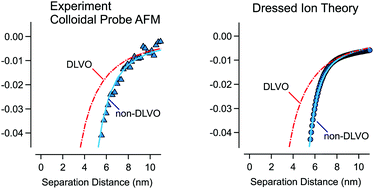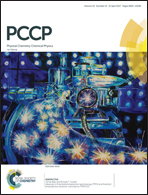Interactions between charged particles with bathing multivalent counterions: experiments vs. dressed ion theory
Abstract
We compare the recent experimentally measured forces between charged colloidal particles, as well as their effective surface potentials (surface charge) in the presence of multivalent counterions in a bathing monovalent salt solution, with the predictions of the dressed ion theory of strongly charged colloidal systems. The benchmark for comparison is provided by the DLVO theory and the deviations from its predictions at small separations are taken as an indication of the additional non-DLVO attractions that can be fitted by an additional phenomenological exponential term. The parameters characterizing this non-DLVO exponential term as well as the dependencies of the effective potential on the counterion concentration and valency predicted by the dressed ion theory are well within the experimental values. This suggests that the deviations from the DLVO theory are probably caused by ion correlations as formalized within the dressed ion theory.



 Please wait while we load your content...
Please wait while we load your content...